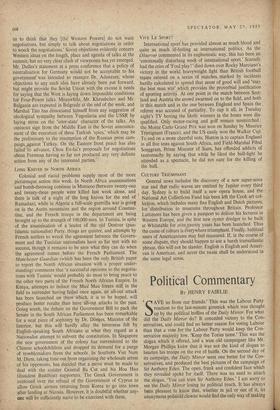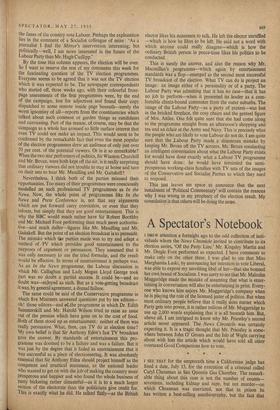Political Commentary
BY HENRY FAIRLIE AVE us from our friends.' This was the Labour Party reaction to the last-minute gimmick which was thought up by the political boffins of the Daily Mirror. For what did the Daily Mirror do? It conceded victory to the Con- servatives, and could find no better reason for voting Labour than that a vote for-the Labour Party would keep the Con- servative majority low. 'Keep the Tories tame.' This was the slogan which it offered, and a wise old campaigner like Mr. Morgan Phillips knew that it was not the kind of slogan to hearten his troops on the eve of battle. On the second day of its campaign, the Daily Mirror went one better for the Con- servatives, and produced the best pictures of the campaign of Site Anthony /Eden. The open, frank and confident face which they revealed spoke for itself. There was no need to attach the slogan, 'You can trust Sir Anthony Eden.' I am sorry to see the Daily Mirror losing its political touch. It has always been pleasant to know that, whether in jail or out of it, its anonymous political clowns would find the only way of makihg the Janes of the country vote Labour. Perhaps the explanation lies in the comment of a Socialist colleague of mine : 'As a journalist I find the Mirror's intervention interesting; but politically—well, I am more interested in the future of the Labour Party than Mr. Hugh Cudlipp.
By the time this column appears, the election will be over. So I want to reserve the rest of my comments this week for the fascinating question of the TV election programmes. Everyone seems to be agreed that it was not the TV election which it was expected to be. The newspaper correspondents who started off, three weeks ago, with their colourful front- page assessments of the first programmes were, by the end of the campaign, lost for adjectives and found their copy dispatched to some remote inside page beneath—surely the worst ignominy of all—reports from the constituencies which talked about such common or garden things as candidates and canvassing. Part of the reason, of course, may be that the campaign as a whole has aroused so little surface interest that even TV could not make an impact. This would seem to be confirmed by the remarkable fact that even the most popular of the election programmes drew an audience of only just over 50 per cent. of the potential viewers. Or is it so remarkable? When the two star performers of politics, Sir Winston Churchill and Mr. Bevan, were both kept off the air, is it really surprising that ordinary viewers did not trouble to stay at home and turn on their sets to hear Mr. Maudling and Mr. Gaitskell? " • Nevertheless, I think both of the parties misused their opportunities. Too many of their programmes were consciously modelled on such professional TV programmes as In the News. Now, the whole point of programmes like In the News and Press Conference is, not that any arguments which are put forward carry conviction, or even that they inform, but simply that they are good entertainment. This is why the BBC would much rather have Sir Robert Boothby and Mr. Michael Foot performing than much more authorita- tive—and ,much duller—figures like Mr. Maudling and Mr. Gaitskell. But the point of an election broadcast is to persuade. The mistake which the parties made was to try and adapt a method of TV which provides good entertainment to the purposes of argument or persuasion. They assumed that it was only necessary to use the tried formula, and the result would be effective. In terms of entertainment it perhaps was. As an In the News programme, the Labour discussion in which Mr. Callaghan and Lady Megan Lloyd George took Part was no doubt a partial success. It could be—and no doubt was—enjoyed as such. But as a vote-getting broadcast it was, by general agreement, a dismal failure. elector likes his statesmen to talk. He left the elector unruffled —which is how he likes to be left. He said not a word with which anyone could really disagree—which is how the ordinary. British person in peace-time likes his politics to be conducted.
This is surely the answer, and also the reason why Mr. Macmillan's programme—which again• by entertainment standards was a flop—emerged as the second most successful TV broadcast of the election. What TV can do is project an image : an image either of a personality or of a party. The Labour Party was admitting that it has no case—that it has no job to perform—when it presented its leader as a com- fortable chintz-bound commuter from the outer suburbs. The image of the Labour Party—as a party of protest—was lost in the bricked fireplace, the cosy chairs and the genteel figure of Mrs. Attlee. One felt quite sure that she had come along, to the programme straight from an afternoon's shopping and tea and an éclair at the Army and Navy. This is precisely what the people who are likely to vote Labour do not do. I am quite sure that the .Labour Party made a disastrous mistake by keeping Mr. Bevan off the TV screens. Mr. Bevan conducting an intelligent conversation about what the Labour Party exists for would have done exactly what a Labour TV programme should have done: he would have reminded the semi- prosperous working-class families with TV sets of the images of the Conservative and Socialist Parties to which they used to respond.
This just leaves me space to announce that the next instalment of 'Political Commentary' will contain the reasons why I was wrong in my prophecy of the election result. My consolation is that others will be doing the same.



































 Previous page
Previous page